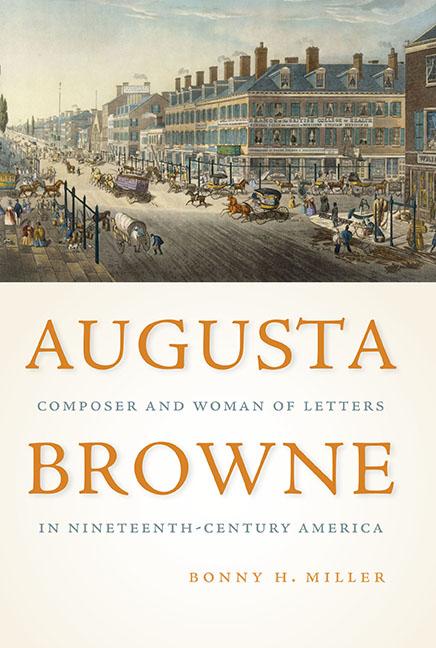Book contents
- Frontmatter
- Contents
- List of Illustrations
- Preface
- Acknowledgments
- Introduction
- 1 First Steps
- 2 Apprentice in a Family Music Business
- 3 Philadelphia Debut
- 4 A Young Professor of Music
- 5 A New Leaf
- 6 Her Own Woman
- 7 Courtship and Consequences
- 8 Pilgrim in Progress
- 9 “Glad Fruition”
- 10 Legacy in Music
- 11 Legacy in Literature
- 12 Contributions to Music Journalism
- 13 A Legacy Written into History
- Appendixes
- Appendixe 1 Children and Descendants of David Samuel Browne and Elizabeth Montgomery Browne
- Appendixe 2 Chronology of Augusta Browne’s Music and Letters
- Appendixe 3 List of Musical Works
- Appendix 4 Selected Glossary
- List of Abbreviations
- Notes
- Selected Bibliography
- Index
13 - A Legacy Written into History
Published online by Cambridge University Press: 23 October 2020
- Frontmatter
- Contents
- List of Illustrations
- Preface
- Acknowledgments
- Introduction
- 1 First Steps
- 2 Apprentice in a Family Music Business
- 3 Philadelphia Debut
- 4 A Young Professor of Music
- 5 A New Leaf
- 6 Her Own Woman
- 7 Courtship and Consequences
- 8 Pilgrim in Progress
- 9 “Glad Fruition”
- 10 Legacy in Music
- 11 Legacy in Literature
- 12 Contributions to Music Journalism
- 13 A Legacy Written into History
- Appendixes
- Appendixe 1 Children and Descendants of David Samuel Browne and Elizabeth Montgomery Browne
- Appendixe 2 Chronology of Augusta Browne’s Music and Letters
- Appendixe 3 List of Musical Works
- Appendix 4 Selected Glossary
- List of Abbreviations
- Notes
- Selected Bibliography
- Index
Summary
The lives of American women musicians born before the Civil War remain largely unknown. Although Augusta Browne may be better described as an ingenious composer than a composer of genius, such minor figures may illuminate their time and place better than stories of celebrities. As Virginia Woolf put it, “History is too much about wars; biography too much about great men.” In the eff ort to “repopulate” the American music scene during the one hundred years from the Revolutionary War to Reconstruction, scholars are uncovering many women whose names and activities have emerged through newly digitized materials from the past: printed music, newspapers, magazines, books, personal letters, diaries, and business correspondence. These sources confirm that the American music business was a brisk commercial marketplace in which women participated as professionals and producers as well as consumers throughout the nineteenth century.
Male musicians in early America needed to be jacks-of-all-musical-trades to make ends meet: they taught, sold musical goods, conducted in theaters, played in bands and orchestras, published music or instruction books, and composed, just as Augusta's father, David Browne, did when he arrived in North America in 1820. Like their male counterparts, women sought out teaching, publications, and playing for worship, in addition to occasional concert performing, but they had fewer options overall. Some women— Augusta among them—avoided questionable workplace venues (e.g., beer halls, pleasure gardens, and theaters) that hired musicians for orchestras or entertainment. Female academies and churches were the institutions most likely to employ women as professional staff , but men usually held the top teaching or administrative posts. Women were denied access to board positions and even membership in the elite cultural institutions that steered musical activity in urban centers.
Nineteenth-century patriarchal ideology dictated that women should serve with selflessness and sacrifice. Augusta was reared to be pious, modest, and self-abnegating. Her life and prose arguably demonstrated these values, yet ultimately she embodied neither domesticity nor rebellion against it. As a little girl, Augusta provided the agile hands to demonstrate her parents’ teaching. That relationship reversed as she entered adulthood.
- Type
- Chapter
- Information
- Augusta BrowneComposer and Woman of Letters in Nineteenth-Century America, pp. 299 - 305Publisher: Boydell & BrewerPrint publication year: 2020



